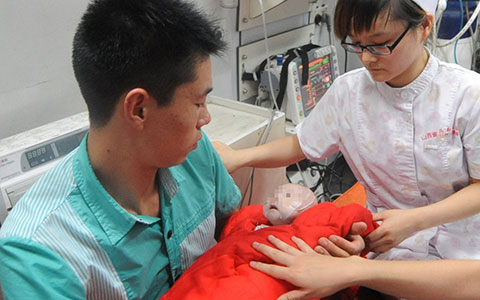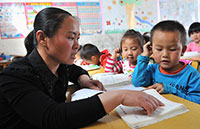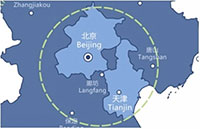National Human Rights Action Plan of China (2012-2015)
(Xinhua) Updated: 2012-06-11 16:20(6) Right to participate
Further efforts will be made to improve the systems, diversify the forms and open up the channels of democracy, to expand citizens' orderly participation in political affairs.
- Implementing the Electoral Law, and guarantee citizens' right to vote and to be elected.
- Ensuring and supporting the participation of non-Communist parties and figures without party affiliation in the exercise of state power, consultation on major state policies and choice of state leaders, administration of state affairs, and formulation and implementation of state policies, laws and regulations.
- Soliciting public opinion when formulating laws or regulations that concern major public interests and the vital interests of the people.
- Continuously supporting the trade unions, the Communist Youth League, the women's federations and other mass organizations in their participation in social management and provision of public services in accordance with the law. The government will wholeheartedly gather opinions from the mass organizations when formulating and amending relevant laws, regulations and public policies.
- Encouraging orderly participation by social organizations in social construction. The Law on Philanthropy will be formulated, and the Regulations on the Registration of Social Organizations, the Interim Regulations on the Registration of Private Non-enterprise Entities and the Regulations on the Management of Foundations will be amended. The government will standardize activities of voluntary services and expedite the development of voluntary services.
- Improving the system of workers' congress and the system of directors and supervisors from among workers, and giving support to trade unions in participating in the management of enterprises and public institutions on behalf of workers and staff. Efforts will be made to gradually realize the goal of full coverage of the system of workers' congress in state and collective enterprises and state- and collective-controlled enterprises where trade union organizations are established, and in more than 80% of non-public enterprises with trade union organizations.
- Further developing and improving the system of self-governance at the primary level of society.
(7) Right to be heard
The government will take effective measures to ensure that all channels of self-expression are unblocked, and citizens' freedom of speech and right to be heard are protected in accordance with the law.
- The state respects and guarantees the rights of all parties and groups and deputies from all ethic groups and all walks of life in the Chinese People's Political Consultative Conference (CPPCC) to voice their opinions, to go on inspection tours, to put forward motions, to reflect social conditions and public opinion, and to take part in investigation and inspection activities.
- Through communication with the public in various ways, state organs and their functionaries will earnestly learn what they want and solicit their opinions.
- The mechanism whereby the masses express their wishes will be improved, and the channels for people to make petitions in the form of letters and personal visits will remain unblocked and be broadened. Such practices as Green Post, online complaints, special telephone lines, video complaints and agencies which make complaints on behalf of others will be promoted and improved so as to ensure the implementation of the Regulations on Petitions in the Form of Letters and Visits. The state will persist in requiring leading cadres at all levels to read letters from the people and make comments or issue instructions concerning them, and improve the system in which leading cadres receive visitors who come to make complaints, and visit grassroots localities. Efforts will be made to enhance the construction, promotion and application of the complaint information system. We will further strengthen the building of a state-level complaint-handling center, and set up a comprehensive platform to deal with complaints quickly and efficiently.
- The state will guarantee employees' right to be heard. The making and revision of labor rules and regulations in enterprises will be discussed at workers' congress in advance, so as to ensure that channels are unblocked for employees to express appeals concerning their interests.
- The state will strengthen institutional guarantees for the legitimate rights and interests of news agencies and journalists, ensuring in accordance with the law journalists' rights to be informed, to gather materials, to publish, to criticize, and to supervise, and safeguarding the legitimate rights and interests of news agencies, journalists, editors and other persons concerned.
(8) Right to oversee
The government will make unremitting efforts to improve the system of supervision, strengthen restraints on and supervision over the exercise of power, and earnestly guarantee citizens' right of democratic supervision.
- Strengthening the supervision over the people's governments, people's courts and people's procuratorates by people's congresses and their standing committees at all levels, and strengthening supervision over leading cadres, so as to ensure the correct exercise of power.
- Giving full play to the CPPCC's role in democratic supervision. Efforts will be intensified to strengthen supervision over the implementation of major policies and the performance of state organs and their functionaries by all participating parties and groups, and people from all ethnic groups and all walks of life in the CPPCC in the forms of making proposals and voicing criticisms.
- Improving the system of supervision over regulations and normative documents. Efforts will be made in seriously studying and handling suggestions by individuals and organizations for reviewing such regulations and documents in accordance with relevant rules. Work will be done to strengthen the filing and examination work regarding regulations and normative documents, so as to prevent illegitimate increase of the obligations of any individuals and organizations.
- Intensifying the supervision and restraint over the power of administrative examination and approval by pushing forward the publicizing of the process and results of such examination and approval, and strengthening monitoring throughout the whole process.
- Strictly implementing the administrative accountability system prescribed by the Civil Servant Law and the Law on Administrative Supervision, intensifying investigations regarding the accountability in accidents in production safety, food and drug quality, land requisition and environmental pollution, and punishing in accordance with the law those who infringe on the interests of the people because of dereliction of duty or malfeasance.
- Amending the Measures for Offence Reporting Work and Regulations on the Protection of Whistle-Blowers. The violations reported, the situation of the report and relevant information about informants will be kept confidential; acts obstructing, repressing and avenging the informants will be corrected timely so as to protect their legitimate rights and interests.
- Guaranteeing the right of citizens and social organizations in exercising supervision over administrative organs in accordance with the law by applying for administrative reconsideration or instituting administrative litigation.
- Expanding social supervision by enhancing the functions of special inspectors, supervisors and examiners, and strengthening the public's supervision over administrative, trial and procuratorial organs.
- Encouraging news media to play their unique role in supervision by public opinion, and opening up the channels for people to criticize, give advice to, complain of, accuse and impeach state organs and state functionaries.
- Man deported to China in test-taking scandal
- 155 Chinese workers pardoned
- Govt, business propose quantum leap
- Ex-environmental official held in probe
- 'Truth' sought after claims made against Shaolin abbot
- 38.7b yuan in State assets recovered in campaign
- China's future megalopolis gathers momentum as young people return
- Eyes focus on the games as showgirls cover up
- Demand for English-speaking staff soar at workplaces
- Chinese like shopping on US websites







